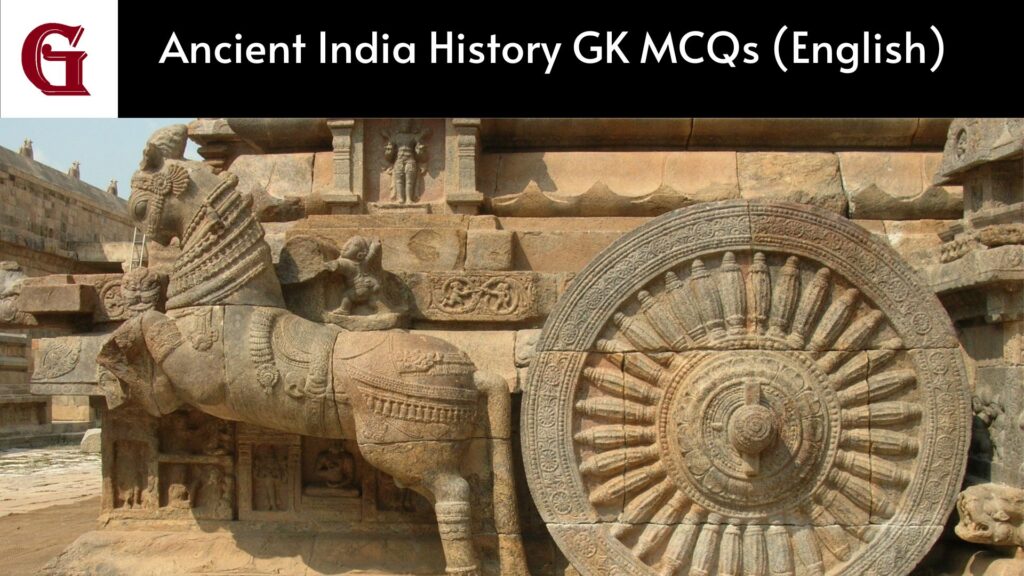Indian History GK MCQ questions in English for the preparation of competitive exams.
Results
#1. Subhash Chandra Bose set up the provisional Government of Free India in ?
#2. What is the means of Buddha?
#3. When did the best productions of Gandhara sculpture appear?
#4. In which year Lala Lajpat Rai was deported to Mandalay for organizing the agrarian movement in Punjab?
#5. Who was the governor-general during the Second Anglo-Mysore War ?
#6. When Mahatma Gandhi was assassinated, who said, ‘None will believe that a man like this in body and soul ever walked on this earth’?
#7. Who was popularly known as ‘Nana Saheb’?
#8. The origin of Indian music can be traced to which of the following Vedic Samhitas?
#9. What is known as Jain literature?
#10. In which year was the Indian National Congress formed:
#11. In violation of the Salt Laws, Gandhiji started a movement called:
#12. Who was the last Viceroy of India?
#13. Identify the UNESCO approved World Heritage Site from the following:
#14. Who among the following assassinated Sir William Hutt Curzon Wyllie in London ?
#15. The Communal Award of 1932, gave separate representation to:
#16. Who among the following was one of the founders of the Hindustan Republic Association ?
#17. By which Charter Act, the East India Company’s monopoly of trade with China came to an end?
#18. The founder of the ‘Arya Samaj’ was:
#19. Which Indian ruler fought the Kalinga War?
#20. Name the oldest Indian civilization?
Press Finish for the result of History GK MCQ questions in English.
Indian History GK : Important One Liner
- The Indus Valley Civilization is one of the oldest urban civilizations in the world.
- The Maurya Empire, under the reign of Ashoka, saw the spread of Buddhism.
- The Mughal Empire reached its peak during the rule of Emperor Akbar.
- The British East India Company established its first factory in India in Surat in 1612.
- The Indian Rebellion of 1857 marked a significant turning point in India’s struggle for independence.
- The Indian National Congress was founded in 1885 and played a crucial role in the freedom movement.
- Mahatma Gandhi led the non-violent civil disobedience movement against British rule.
- India gained independence from British rule on August 15, 1947.
- The partition of India in 1947 led to the formation of India and Pakistan.
- The Constitution of India was adopted on January 26, 1950, making India a republic.
- India’s first Prime Minister was Jawaharlal Nehru, serving from 1947 to 1964.
- The Green Revolution in the 1960s brought significant advancements in agricultural productivity.
- India conducted its first nuclear test in 1974, becoming a nuclear power.
- Indira Gandhi, the daughter of Jawaharlal Nehru, served as India’s first female Prime Minister.
- The economic liberalization policies were introduced in India in 1991, leading to economic reforms.
- Dr. A.P.J. Abdul Kalam, known as the Missile Man of India, served as the President from 2002 to 2007.
- India became a nuclear-armed nation with the Pokhran-II nuclear tests in 1998.
- The Indian Space Research Organisation (ISRO) successfully launched its first satellite, Aryabhata, in 1975.
- India has a rich cultural heritage, including diverse art forms, music, dance, and literature.
- The Taj Mahal, a UNESCO World Heritage Site, is a symbol of India’s architectural marvel and love story.

Please provide yearly current affair MCQ
Hi iam eswar from vzm